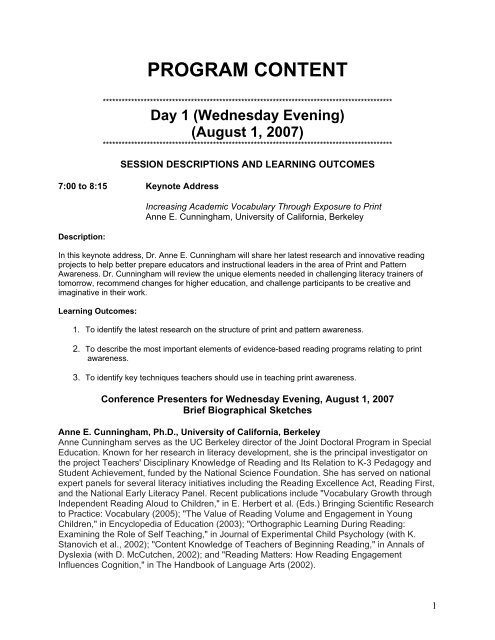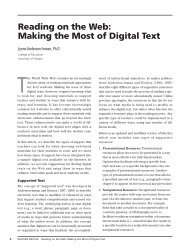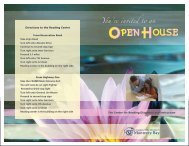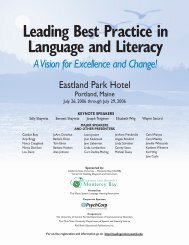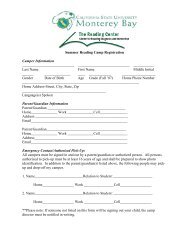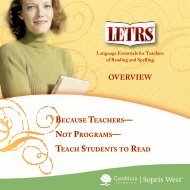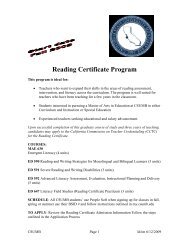program content - The Center for Reading Diagnosis and Instruction
program content - The Center for Reading Diagnosis and Instruction
program content - The Center for Reading Diagnosis and Instruction
Create successful ePaper yourself
Turn your PDF publications into a flip-book with our unique Google optimized e-Paper software.
PROGRAM CONTENT<br />
********************************************************************************************<br />
Day 1 (Wednesday Evening)<br />
(August 1, 2007)<br />
********************************************************************************************<br />
SESSION DESCRIPTIONS AND LEARNING OUTCOMES<br />
7:00 to 8:15 Keynote Address<br />
Description:<br />
Increasing Academic Vocabulary Through Exposure to Print<br />
Anne E. Cunningham, University of Cali<strong>for</strong>nia, Berkeley<br />
In this keynote address, Dr. Anne E. Cunningham will share her latest research <strong>and</strong> innovative reading<br />
projects to help better prepare educators <strong>and</strong> instructional leaders in the area of Print <strong>and</strong> Pattern<br />
Awareness. Dr. Cunningham will review the unique elements needed in challenging literacy trainers of<br />
tomorrow, recommend changes <strong>for</strong> higher education, <strong>and</strong> challenge participants to be creative <strong>and</strong><br />
imaginative in their work.<br />
Learning Outcomes:<br />
1. To identify the latest research on the structure of print <strong>and</strong> pattern awareness.<br />
2. To describe the most important elements of evidence-based reading <strong>program</strong>s relating to print<br />
awareness.<br />
3. To identify key techniques teachers should use in teaching print awareness.<br />
Conference Presenters <strong>for</strong> Wednesday Evening, August 1, 2007<br />
Brief Biographical Sketches<br />
Anne E. Cunningham, Ph.D., University of Cali<strong>for</strong>nia, Berkeley<br />
Anne Cunningham serves as the UC Berkeley director of the Joint Doctoral Program in Special<br />
Education. Known <strong>for</strong> her research in literacy development, she is the principal investigator on<br />
the project Teachers' Disciplinary Knowledge of <strong>Reading</strong> <strong>and</strong> Its Relation to K-3 Pedagogy <strong>and</strong><br />
Student Achievement, funded by the National Science Foundation. She has served on national<br />
expert panels <strong>for</strong> several literacy initiatives including the <strong>Reading</strong> Excellence Act, <strong>Reading</strong> First,<br />
<strong>and</strong> the National Early Literacy Panel. Recent publications include "Vocabulary Growth through<br />
Independent <strong>Reading</strong> Aloud to Children," in E. Herbert et al. (Eds.) Bringing Scientific Research<br />
to Practice: Vocabulary (2005); "<strong>The</strong> Value of <strong>Reading</strong> Volume <strong>and</strong> Engagement in Young<br />
Children," in Encyclopedia of Education (2003); "Orthographic Learning During <strong>Reading</strong>:<br />
Examining the Role of Self Teaching," in Journal of Experimental Child Psychology (with K.<br />
Stanovich et al., 2002); "Content Knowledge of Teachers of Beginning <strong>Reading</strong>," in Annals of<br />
Dyslexia (with D. McCutchen, 2002); <strong>and</strong> "<strong>Reading</strong> Matters: How <strong>Reading</strong> Engagement<br />
Influences Cognition," in <strong>The</strong> H<strong>and</strong>book of Language Arts (2002).<br />
1
Lou Denti, Ph.D., Cali<strong>for</strong>nia State University – Monterey Bay<br />
Lou Denti, Ph.D., is the Lawton Love Distinguished Professor in Special Education at Cali<strong>for</strong>nia<br />
State University, Monterey Bay. His research interests include special education policy,<br />
differentiating instruction, struggling readers at the secondary level, <strong>and</strong> alternative education.<br />
His recent book is entitled New Ways of Looking at Learning Disabilities: Connections to<br />
Classroom Practice. His new book of poetry “Shadows <strong>and</strong> Moon” published by Caddo Gap<br />
Press delves into the feelings students experience when they just don’t quite fit in. He currently<br />
directs the <strong>Center</strong> <strong>for</strong> <strong>Reading</strong> <strong>Diagnosis</strong> <strong>and</strong> <strong>Instruction</strong> at CSUMB. He is editing a new book<br />
due out in October 2007 entitled Effective Practice <strong>for</strong> Adolescents with Literacy Challenges.<br />
Wayne Secord, Ph.D., <strong>The</strong> Ohio State University, Columbus, Ohio<br />
Wayne A. Secord, Ph.D., is currently a Senior Research Scientist in the Department of Speech<br />
<strong>and</strong> Hearing Science at <strong>The</strong> Ohio State University. Dr. Secord has authored or co-authored<br />
numerous articles, books, tests <strong>and</strong> intervention <strong>program</strong>s on assessment <strong>and</strong> treatment of<br />
speech <strong>and</strong> language disorders, <strong>and</strong> served as the editor of Language, Speech, <strong>and</strong> Hearing<br />
Services in Schools from 1992 to 1998. An ASHA Fellow, Dr. Secord is a frequent conference<br />
presenter <strong>and</strong> a nationally recognized expert on clinical <strong>and</strong> educational assessment <strong>and</strong> the<br />
delivery of school-based services.<br />
********************************************************************************************<br />
Day 2 (Thursday)<br />
(August 2, 2007)<br />
********************************************************************************************<br />
SESSION DESCRIPTIONS AND LEARNING OUTCOMES<br />
(8:45 to 10:00) Day 2 Keynote Address<br />
Presenter:<br />
Going the Extra Mile:<br />
Implementing Effective Programs <strong>and</strong> Strategies <strong>for</strong> Struggling Readers<br />
Anita Archer, Ph.D., Educational Consultant, Portl<strong>and</strong>, Oregon<br />
Description:<br />
In her keynote address, Dr. Anita Archer will discuss her research findings with respect to evidencedbased<br />
leadership-oriented interventions <strong>for</strong> struggling readers. She will examine how instructional<br />
leaders can trans<strong>for</strong>m schools utilizing a multi-tier leadership approach. <strong>The</strong> presentation will focus on<br />
key instructional strategies that all literacy teams should utilize <strong>and</strong> how team leaders create supportive<br />
learning environments <strong>for</strong> all children.<br />
Learning Outcomes:<br />
1. To describe what research shows to be the most effective interventions available today <strong>for</strong><br />
2
struggling readers.<br />
2. To identify key elements in all leadership-oriented reading <strong>program</strong>s that work.<br />
3. To describe what instructional leaders should do to establish effective reading <strong>program</strong>s in their<br />
schools.<br />
To identify key techniques teachers should use in teaching print awareness.<br />
(10:30 to 12:00) Concurrent Sessions, <strong>and</strong><br />
(1:30 to 3:00) Concurrent Sessions Repeated<br />
(3:30 to 5:00)<br />
(Session 1)<br />
Presenter:<br />
Nonfiction <strong>Reading</strong> Skills <strong>and</strong> Strategies: Empowering <strong>and</strong> Motivating<br />
Students to Succeed in School<br />
Anita Archer, Ph.D, Portl<strong>and</strong>, Oregon<br />
Description:<br />
This <strong>program</strong> will take a critical look at the skills <strong>and</strong> strategies that empower <strong>and</strong> motivate<br />
readers to comprehend <strong>and</strong> appreciate nonfiction literacy <strong>content</strong> <strong>and</strong> materials. It will consider<br />
recent research in the teaching of nonfiction to readers of all abilities, <strong>and</strong> discuss how<br />
instructional leaders create successful <strong>program</strong>s that serve all children <strong>and</strong> especially children<br />
from culturally <strong>and</strong> linguistically diverse backgrounds.<br />
Learning Outcomes:<br />
1. To identify critical skills <strong>and</strong> strategies used in teaching nonfiction <strong>content</strong> to readers of<br />
varying abilities.<br />
2. To discuss recent research on teaching using nonfiction materials in the classroom.<br />
3. To describe new strategies <strong>for</strong> helping children from culturally <strong>and</strong> linguistically varied<br />
backgrounds.<br />
(Session 2)<br />
Presenter:<br />
Codes <strong>and</strong> Contexts: Developing Cultural Competence<br />
Li-Rong Lilly Cheng, San Diego State University<br />
Description:<br />
Humans communicate by using codes. <strong>The</strong>re are many types of codes: verbal, nonverbal,<br />
paralanguage, <strong>and</strong> discourse. Our students come into our schools with many codes <strong>and</strong> they<br />
have learned these codes in a variety of contexts, Codes can be <strong>for</strong>mal or in<strong>for</strong>mal <strong>and</strong> the rules<br />
<strong>for</strong> using codes may change depending on the contexts in which the codes are presented <strong>and</strong><br />
learned. Codes are the vehicles <strong>for</strong> the transmission of meaning. Different cultures <strong>and</strong><br />
languages use different codes to achieve this goal. In addition, different rules are at work<br />
depending on the different contexts. Knowing about the existence of these explicit <strong>and</strong> implicit<br />
rules does not mean knowing how to use them appropriately across cultures. Teachers, parents<br />
3
<strong>and</strong> SLPs need to be aware of these codes <strong>and</strong> contexts in order to develop their cultural <strong>and</strong><br />
social intelligence.<br />
Learning Outcomes:<br />
1. To describe the different <strong>for</strong>ms of codes;<br />
2. To identify communication breakdown due to differences in codes;<br />
3. To assess one’s own cultural intelligence;<br />
4. To assess one’s own intelligence;<br />
(Session 3)<br />
Presenters:<br />
Assessing Spelling in Authentic Contexts<br />
Julie J. Masterson, Missouri State University<br />
Kenn Apel, Florida State University<br />
Description:<br />
Spelling is influenced by an individual’s knowledge of multiple linguistic factors (phonemic<br />
awareness, orthography, semantics <strong>and</strong> morphology) <strong>and</strong> the ability to store adequate mental<br />
representations. Although there are a few inventories that allow assessment of these skills,<br />
most spelling tests rely on a correct/incorrect system. We will explain how to use children’s<br />
spellings from inventories or connected writing to determine skills <strong>and</strong> needs in each of the<br />
influential components.<br />
Learning Outcomes:<br />
1. To identify potential orthographic targets <strong>for</strong> treatment.<br />
2. To determine the nature of orthographic errors.<br />
3. To code errors according to the indicated limitations in linguistic components.<br />
(Session 4)<br />
Presenters:<br />
Using Spelling <strong>Instruction</strong> to Improve Literacy Outcomes<br />
Kenn Apel, Florida State University<br />
Julie J. Masterson, Missouri State University<br />
Description:<br />
<strong>The</strong> success of students’ academic, vocational, <strong>and</strong> social endeavors often hinges on their<br />
literacy abilities. In this second of two presentations, we will discuss strategies <strong>and</strong> procedures<br />
<strong>for</strong> improving students’ spelling abilities <strong>and</strong>, as a by-product, their word-level reading abilities.<br />
Contrasts between current approaches <strong>and</strong> newer, research- <strong>and</strong> theory-based instructional or<br />
intervention approaches will be reviewed <strong>and</strong> practical experiences provided.<br />
Learning Outcomes:<br />
1. To describe developmental vs. prescriptive approaches to spelling instruction.<br />
2. To develop specific skills <strong>for</strong> facilitating students’ spelling abilities.<br />
3. To demonstrate an underst<strong>and</strong>ing of the relationship between spelling <strong>and</strong> reading.<br />
(Session 5)<br />
Guiding <strong>Instruction</strong> <strong>for</strong> Struggling Readers<br />
4
Presenter:<br />
Laura R. Matter, Cali<strong>for</strong>nia State University - Monterey Bay<br />
Description:<br />
<strong>The</strong> process of assessment usually focuses on the initial stage of gathering data. Data is<br />
collected, but then what? This presentation will include in<strong>for</strong>mation regarding helpful <strong>for</strong>mal <strong>and</strong><br />
in<strong>for</strong>mal literacy screenings, assessments, <strong>and</strong> inventories, as well as progress monitoring<br />
<strong>program</strong>s <strong>and</strong> how they can guide reading instruction <strong>for</strong> students. <strong>Instruction</strong>al <strong>program</strong>s that<br />
target student needs will be outlined. Successful techniques on how to use assessment data to<br />
better communicate with parents will be presented, as well as how to better communicate<br />
assessment data among school staff.<br />
Learning Outcomes:<br />
1. To discuss <strong>for</strong>mal <strong>and</strong> in<strong>for</strong>mal classroom assessment materials.<br />
2. To evaluate the purpose <strong>and</strong> value of classroom assessments to guide instruction.<br />
3. To identify ways to use assessment data to improve communication between school,<br />
clinic staff <strong>and</strong> parents.<br />
(12:00 to 1:30) Special Lunch Presentation – 45 Minutes<br />
Presenter:<br />
“A Profession at Risk: Speech <strong>and</strong> Language Pathology in Schools”<br />
Michael Towey, M.A., Waldo County Hospital, Belfast, ME<br />
Description:<br />
This special lunch presentation will take a broad view of leadership at all levels <strong>and</strong> apply<br />
successful concepts to the educational environment. It will consider key leadership skills<br />
needed to lead change, not manage it, <strong>and</strong> provide participants with a “leadership tool-kit” that<br />
will help them identify where leadership is needed, design action plans that work, <strong>and</strong> leave<br />
them with practical ideas <strong>for</strong> making their own leadership skills a reality.<br />
Learning Outcomes:<br />
1. To underst<strong>and</strong> the implications of diminished educational leadership <strong>and</strong> economic<br />
opportunity.<br />
2. To describe the key leadership skills necessary <strong>for</strong> effective change in educational<br />
settings.<br />
3. To implement key leadership ‘tool box’ activities in individual work settings.<br />
Conference Presenters <strong>for</strong> Day 2, Thursday, August 2, 2007<br />
Brief Biographical Sketches<br />
Kenn Apel, Ph.D., Florida State University<br />
5
Kenn Apel, Ph.D. is a professor of communication disorders at <strong>The</strong> Florida State University,<br />
where he teaches courses <strong>and</strong> conducts research on school-age language-learning disabilities.<br />
He has more than 25 years of experience conducting research <strong>and</strong> teaching classes on<br />
language learning <strong>and</strong> on working with children, adolescents, <strong>and</strong> adults who have language<br />
problems <strong>and</strong> language-based learning deficits.<br />
Anita Archer, Ph.D., Portl<strong>and</strong>, Oregon<br />
Lilly Cheng, Ph.D., San Diego State University, CA<br />
Li-Rung Lilly Cheng, Ph.D., is Professor of Communicative Disorders <strong>and</strong> Associate Director<br />
of Global Partnership Development (GPD) of the Office of the President at Cali<strong>for</strong>nia State<br />
University San Marcos (CSU). Dr. Cheng is a nationally <strong>and</strong> internationally recognized expert in<br />
bilingual acquisition, language <strong>and</strong> culture, <strong>and</strong> cross-cultural communication. A frequent<br />
conference presenter <strong>and</strong> an ASHA Fellow, Dr. Cheng was the recipient of the 1997 ASHA<br />
Award <strong>for</strong> Multicultural Affairs.<br />
Julie J. Masterson, Ph.D., Missouri State University<br />
Julie J. Masterson. Ph.D. is a professor of communication sciences <strong>and</strong> disorders at Missouri<br />
State University, where she teaches courses <strong>and</strong> conducts research in literacy, phonology, <strong>and</strong><br />
computer applications <strong>for</strong> assessment <strong>and</strong> remediation of speech <strong>and</strong> language disorders. Dr.<br />
Masterson has more than 25 years of experience working with students who have language<br />
problems <strong>and</strong> language-based learning deficits.<br />
Laura Matter, M.A., Cali<strong>for</strong>nia State University, Monterey Bay<br />
Laura Matter, M.A., has ten years of teaching in public schools throughout the Salinas Valley in<br />
Cali<strong>for</strong>nia. Her professional experience has focused around teaching English Language<br />
Learners in grades K-4. She attained a Bachelor of Arts degree from the University of Iowa in<br />
1997 in Elementary Education with a specialization in <strong>Reading</strong>. In 2004 she completed a Master<br />
of Arts at San Jose State University in Elementary Education in Literacy across the Curriculum.<br />
Michael Towel, M.A., Waldo County Hospital, Belfast, ME<br />
Michael Towel, M.A., is a language/literacy consultant in one the nation’s inaugural Early<br />
<strong>Reading</strong> First <strong>program</strong>s. His literacy work includes development of a unique evidence based<br />
teacher per<strong>for</strong>mance assessment, a teacher per<strong>for</strong>mance coaching protocol, explicit literacy<br />
book sharing lesson plans <strong>and</strong> extensive teacher training strategies. Mike provides classroom<br />
‘coaching’ to preschool teachers in high quality inclusive classrooms. He is the President of the<br />
Maine Speech Language Hearing Association, manager of the Speech Language Pathology<br />
<strong>program</strong> at Waldo County Hospital <strong>and</strong> serves on the Maine Commissioner of Education’s<br />
Steering Committee <strong>for</strong> early intervention services.<br />
********************************************************************************************<br />
Day 3 (Friday)<br />
(August 3, 2007)<br />
********************************************************************************************<br />
6
SESSION DESCRIPTIONS AND LEARNING OUTCOMES<br />
(8:45 to 10:00) Day 3 Keynote Address<br />
Literacy in a Digitized World:<br />
Where We Now <strong>and</strong> Where Are Are We Going?<br />
Presenter:<br />
Lynne Anderson-Inman, Ph.D., Director, <strong>Center</strong> <strong>for</strong> Advanced Technology in Education,<br />
University of Oregon<br />
Description:<br />
This keynote address will focus on the use of technology to improve reading, writing <strong>and</strong><br />
studying, with special emphasis on strategies <strong>for</strong> using technology to enhance the<br />
academic success of struggling learners in America’s schools. Dr. Anderson-Inman will<br />
discuss her work in computer-based study strategies <strong>and</strong> the use of digital books with<br />
“supported text.” She will also share her more recent research that led to the<br />
development of a national research center to study how “supported text” can have a<br />
positive impact on the achievement levels of secondary students.<br />
Learning Outcomes:<br />
1. To discuss the role that technology has in improving reading instruction especially in<br />
struggling readers.<br />
2. To identify how digital books with “supported text” can play an important role in reading<br />
intervention.<br />
3. To discuss recent research from her new national center <strong>for</strong> the study of “supported text”<br />
instruction.<br />
(10:30 to 12:00) Concurrent Sessions, <strong>and</strong><br />
(1:30 to 3:00) Concurrent Sessions Repeated<br />
(3:30 to 5:00)<br />
(Session 1)<br />
Presenter:<br />
Wired <strong>for</strong> Success: Digital Games, Simulations, <strong>and</strong> Virtual Worlds<br />
Stacy L. Williams, Ph.D., Case Western Reserve University, Clevel<strong>and</strong>,<br />
Ohio<br />
Program Summary<br />
Digital games, simulations, <strong>and</strong> virtual worlds are powerful media tools <strong>for</strong> building language<br />
<strong>and</strong> literacy skills, creating community among students <strong>and</strong> therapists <strong>and</strong> enhancing critical<br />
thinking <strong>and</strong> problem solving skills. <strong>The</strong>se applications promote learning in a safe, controlled,<br />
learner-centered environment wherein students can repeatedly practice a range of skills without<br />
the risk of failure.<br />
Learning Outcomes<br />
7
1. Participants will describe the differences <strong>and</strong> similarities of digital games, simulations,<br />
<strong>and</strong> virtual worlds<br />
2. Participants will identify a variety of digital environments <strong>and</strong> their potential use in<br />
language <strong>and</strong> literacy intervention.<br />
3. Participants will explain the importance of immersive computer mediated environments<br />
such as immersive virtual reality, digital games, <strong>and</strong> virtual worlds <strong>and</strong> their application<br />
to language <strong>and</strong> literacy instruction.<br />
4. Participants will be able to identify <strong>and</strong> discuss the critical components necessary <strong>for</strong><br />
creating effective digital learning environments.<br />
5. Participants will analyze <strong>and</strong> discuss possible digital solutions to enhance traditional<br />
language <strong>and</strong> literacy instruction<br />
(Session 2)<br />
Presenter:<br />
Literacy Assessment in Perspective: Utilizing Individualized Diagnostic<br />
Assessment to Foster Student Achievement<br />
Richard D. McCallum, Ph.D., University of Cali<strong>for</strong>nia, Berkeley<br />
Description:<br />
<strong>The</strong> purpose of this presentation is to provide school personnel with a framework <strong>for</strong><br />
underst<strong>and</strong>ing of the value <strong>and</strong> power of collecting individualized diagnostic assessment data in<br />
reading. By the end of the session, participants will be able to: 1) Underst<strong>and</strong> the role of<br />
individualized diagnostic assessment in literacy re<strong>for</strong>m; 2) Develop a conceptual framework <strong>for</strong><br />
underst<strong>and</strong>ing the role of diagnostic assessment in instruction; 3) Examine how one<br />
assessment tool (DORA from LetsGoLearn, Inc.) attempts to implement this framework, <strong>and</strong>; 4)<br />
Link specific instructional approaches to diagnostic in<strong>for</strong>mation derived from this framework.<br />
Learning Outcomes:<br />
1. To underst<strong>and</strong> the role of individualized diagnostic assessment in literacy re<strong>for</strong>m.<br />
2. To develop a conceptual framework <strong>for</strong> underst<strong>and</strong>ing the role of diagnostic assessment<br />
in instruction.<br />
3. To examine how one assessment tool (DORA from LetsGoLearn, Inc.) attempts to<br />
implement this framework.<br />
4. To link specific instructional approaches to diagnostic in<strong>for</strong>mation derived from this<br />
framework.<br />
8
(Session 3)<br />
Presenter:<br />
Effective Integration of Software into Language <strong>and</strong> Literacy <strong>Instruction</strong>.<br />
Carl L. Ferguson Jr., Ph.D., Cali<strong>for</strong>nia State University – Monterey Bay<br />
Description:<br />
<strong>The</strong> purpose of this <strong>program</strong> is to highlight how computer software can be used effectively to<br />
support reading <strong>and</strong> writing interventions. Dr. Ferguson will discuss how a number of software<br />
<strong>program</strong>s work, share important ideas on when <strong>and</strong> how they should be used, <strong>and</strong> most<br />
importantly, discuss how they can be successfully integrated into current approaches to<br />
teaching reading in the schools.<br />
Learning Outcomes:<br />
1. To describe how computer software <strong>program</strong>s can be used effectively to support literacy<br />
interventions.<br />
2. To identify software <strong>program</strong>s that are evidence-based.<br />
3. To describe how teachers <strong>and</strong> clinicians can successfully integrate computer application<br />
into their daily instructional routines.<br />
3:30 to 5:00 Special Leadership Think Tank Presentation<br />
Back to the Future:<br />
Technology Integration Into Language <strong>and</strong> Literacy <strong>Instruction</strong><br />
Presenters:<br />
Participants:<br />
Lynn Anderson-Inman, Carl Ferguson, Richard McCallum, Stacy Williams<br />
Conference Registrants<br />
Description:<br />
This <strong>program</strong> will be a coming together of the minds to share their insights on how technology<br />
integration can positively impact how language <strong>and</strong> literacy are taught in America’s schools.<br />
<strong>The</strong> <strong>program</strong> participants will all speak briefly about their areas of expertise <strong>and</strong> then Dr. Lou<br />
Denti will lead the panel <strong>and</strong> the audience in a focused discussion on how conference<br />
participants can incorporate technological advances in their daily instructional <strong>program</strong>.<br />
Learning Outcomes:<br />
1. To provide a summary of major perspectives on the use of technology <strong>for</strong> language <strong>and</strong><br />
literacy.<br />
2. To critically discuss key points identified within each area of technology.<br />
3. To provide an opportunity <strong>for</strong> participants to share their insights <strong>and</strong> gain feedback on the<br />
approaches they are currently using.<br />
9
Conference Presenters <strong>for</strong> Day 3, Friday, August 3, 2007<br />
Brief Biographical Sketches<br />
Lynne Anderson-Inman, Ph.D., University of Oregon<br />
Lynne Anderson-Inman, Ph.D. has a Ph.D. in special education, with an emphasis on <strong>content</strong>area<br />
reading, writing, <strong>and</strong> studying. She is Director of the <strong>Center</strong> <strong>for</strong> Advanced Technology in<br />
Education (CATE) <strong>and</strong> the <strong>Center</strong> <strong>for</strong> Electronic Studying, both in the College of Education at<br />
the University of Oregon. Dr. Anderson-Inman is an internationally recognized expert on the use<br />
of technology to improve reading, writing <strong>and</strong> studying, with special emphasis on strategies <strong>for</strong><br />
using technology to enhance the academic success of struggling learners at the secondary<br />
level. She pioneered the concept of "computer-supported studying," conducting research <strong>and</strong><br />
developing materials on strategies designed to promote effective learning through the use of<br />
computers as study tools.<br />
Carl L. Ferguson Jr., Ph.D., Cali<strong>for</strong>nia State University – Monterey Bay<br />
Carl L. Ferguson Jr., Ph.D., has 12 years of teaching experience in Higher Education focusing<br />
on <strong>Reading</strong> Methods <strong>and</strong> Assessment Procedures <strong>for</strong> students with learning disabilities <strong>and</strong> 25<br />
years of experience in the Educational arena. Dr. Ferguson received his Ph.D. at V<strong>and</strong>erbilt<br />
University. While at V<strong>and</strong>erbilt, Dr. Ferguson worked on several research <strong>and</strong> development<br />
projects creating reading curriculum based measurement procedures that were eventually<br />
computerized <strong>and</strong> used in general <strong>and</strong> special education settings to provide teachers ongoing<br />
assessment data about their students’ reading, spelling, <strong>and</strong> math per<strong>for</strong>mance. His research<br />
focuses on the continued development of reading assessment procedures that enable teachers<br />
to make ongoing instructional decisions <strong>and</strong> the evaluation of reading methods <strong>for</strong> students with<br />
reading disabilities.<br />
Richard D. McCallum, Ph.D., University of Cali<strong>for</strong>nia, Berkeley<br />
Richard D. McCallum, Ph.D., Richard D. McCallum is the coordinator of the Advanced<br />
<strong>Reading</strong> <strong>and</strong> Language Leadership Program (ARLLP) in the School of Education at the<br />
University of Cali<strong>for</strong>nia, Berkeley, Berkeley, Cali<strong>for</strong>nia.<br />
Stacy L. Williams, Ph.D., Case Western Reserve University<br />
Stacy L. Williams, Ph.D. is an Assistant Professor Communication Sciences <strong>and</strong><br />
Disorders at Case Western Reserve University in Clevel<strong>and</strong>, Ohio. She began her<br />
career as a speech-language pathologist, creating <strong>and</strong> customizing software<br />
<strong>program</strong>s <strong>for</strong> the children she served. Her areas of expertise include augmentative<br />
communication, instructional technology, <strong>and</strong> distance education, all linked to<br />
children’s speech-language development <strong>and</strong> disorders. At present, William’s<br />
primary research objective is to investigate uses of virtual reality simulations <strong>for</strong><br />
subjects with a variety of speech-language disorders.<br />
10
********************************************************************************************<br />
Day 4 (Saturday)<br />
(August 4, 2007)<br />
******************************************************************************<br />
SESSION DESCRIPTIONS AND LEARNING OUTCOMES<br />
(8:45 to 10:00) Day 4 Keynote Address<br />
Presenter:<br />
Science, Sanity, <strong>and</strong> the Prevention of <strong>Reading</strong> Problems:<br />
Improving Educational Practices through Evidenced-Based Innovations<br />
Laura M. Justice, Ph.D., Professor, the Ohio State University, Columbus, Ohio<br />
This keynote address will take a critical look at the theoretical <strong>and</strong> practical challenges that confront all of<br />
us who are interested in preventing reading problems. It will look at a number of strategies that are<br />
known to work but at what costs, <strong>and</strong> delivered whom. It will also consider what we know works in<br />
language <strong>and</strong> literacy intervention from an evidence-based perspective <strong>and</strong> suggest a multi-tier set of<br />
approaches that research tells us are viable <strong>for</strong> use today in building schools that will serve all children.<br />
Learning Outcomes:<br />
1. To discuss where theory <strong>and</strong> pragmatism interact in language <strong>and</strong> literacy interventions.<br />
2. To discuss a costs <strong>and</strong> values model <strong>for</strong> the prevention of reading problems.<br />
3. To review what the growing body of evidence tells us about effective reading instruction.<br />
(10:30 to 12:00) Concurrent Sessions, <strong>and</strong><br />
(1:30 to 3:00) Concurrent Sessions Repeated<br />
(3:30 to 5:00)<br />
(Session 1)<br />
Presenter:<br />
Evidence-Based Intervention Approaches <strong>for</strong> Emergent<br />
Literacy<br />
Laura M. Justice, Ph.D., Ohio State University, Columbus<br />
Description:<br />
SLPs can include systematic <strong>and</strong> explicit attention to emergent literacy targets within their<br />
clinical interventions with young children. In turn, accelerated emergent literacy development<br />
can improve children’s successful transition to <strong>for</strong>mal reading instruction in kindergarten <strong>and</strong><br />
first grade, which may reduce children’s later risks <strong>for</strong> failing to achieve proficient reading<br />
abilities. This session describes evidence-based approaches <strong>for</strong> facilitating preschool children’s<br />
skills in three code-based aspects of emergent literacy development: print knowledge, emergent<br />
writing, <strong>and</strong> phonological awareness. <strong>The</strong> description of these approaches is derived from<br />
empirical studies showing “what works” in emergent literacy intervention.<br />
11
Learning Outcomes:<br />
1. To identify code-based achievements in emergent literacy characteristic of preschoolaged<br />
children.<br />
2. To identify two evidence-based techniques <strong>for</strong> improving preschoolers’ print awareness.<br />
3. To identify two evidence-based techniques <strong>for</strong> improving preschoolers’ emergent writing.<br />
4. To identify two evidence-based techniques <strong>for</strong> improving preschoolers’ phonological<br />
awareness.<br />
(Session 2)<br />
Presenters:<br />
Pathways to Language <strong>and</strong> Literacy: Let’s Get Practical<br />
C<strong>and</strong>ace L. Goldsworthy, Ph.D. Cali<strong>for</strong>nia State University,<br />
Sacramento<br />
Robert A. Pieretti, M.S., Cali<strong>for</strong>nia State University, Sacramento<br />
Description:<br />
<strong>The</strong> purpose of this presentation will be to address how SLPs can take a leadership role in<br />
shaping their futures to align with the above suggestion through a practical approach. <strong>The</strong><br />
language-literacy continuum is comprised of a number of pathways developing separately <strong>and</strong><br />
alongside each other, coming together to strengthen language-literacy acquisition until they<br />
merge onto a super highway of a fully developed oral-written language system. Like the str<strong>and</strong>s<br />
in the braid, the paths represent what a child must pass through to go from a simple to more<br />
complex language system <strong>and</strong> a critical early pathway includes the development of strong<br />
phonological awareness skills.<br />
Learning Outcomes<br />
1. To identify the most critical pathways to language <strong>and</strong> literacy.<br />
2. To identify important phonological awareness outcomes <strong>for</strong> use in RTI Models.<br />
3. To analyze an approach to phonological awareness through the use of children’s<br />
literature<br />
(Session 3)<br />
Presenters:<br />
Building <strong>Instruction</strong>al Leadership Skills: Lessons Learned<br />
from Collaborating with Preschool Teachers<br />
Nancy A. Creaghead, Ph.D., University of Cincinnati<br />
S<strong>and</strong>ra Combs, M.A., University of Cincinnati<br />
Linda Sickman, M.A., University of Cincinnati<br />
Description:<br />
This presentation will describe the experiences of SLPs collaborating with administrators <strong>and</strong> teachers in<br />
inner city Head Start <strong>program</strong>s to help teachers develop skills in using “language-enhancing” talk <strong>and</strong><br />
book reading with children. Results of research to examine changes in teacher behaviors will be<br />
described.<br />
12
Learning Outcomes<br />
1. Describe strategies <strong>for</strong> engaging teachers in using language enrichment strategies in the<br />
classroom.<br />
2. Describe three strategies <strong>for</strong> teachers to use in supporting children’s language development.<br />
3. Describe five strategies <strong>for</strong> teachers to use in focusing on meaning, phonological awareness <strong>and</strong><br />
print during dialogic book reading.<br />
(Session 4)<br />
Presenter:<br />
Helping Children Become Intelligible <strong>and</strong> Literate: <strong>The</strong> Role of<br />
Phonology<br />
Barbara Hodson, Ph.D., Wichita State University, Kansas<br />
Description:<br />
This session focuses on phonology, phonological representation, <strong>and</strong> meta-phonological<br />
awareness. Children with extensive phonological deviations are particularly at risk <strong>for</strong> literacy<br />
difficulties. In<strong>for</strong>mation will be provided explaining phonological pattern deficiencies <strong>and</strong><br />
methods <strong>for</strong> enhancing phonological <strong>and</strong> meta-phonological skills <strong>and</strong> ultimately literacy.<br />
Learning Outcomes:<br />
1. To identify children’s major phonological <strong>and</strong> meta-phonological deficiencies.<br />
2. To determine optimal treatment targets to facilitate the development of phonological <strong>and</strong><br />
meta-phonological skills.<br />
3. To select appropriate tasks <strong>for</strong> enhancing children’s phonological <strong>and</strong> meta-phonological<br />
skills<br />
(Session 5)<br />
Presenter:<br />
Linking Assessment to <strong>Instruction</strong>: <strong>The</strong> Critical Connection<br />
Wayne A. Secord, Ph.D., Ohio State University<br />
Description:<br />
Designing effective classroom intervention means doing a few things extremely well. It means<br />
(1) focusing on functionality (2) prioritizing the most important things, (3) designing intervention<br />
with <strong>and</strong> through others, (4) putting a system in place that works when you’re not there, <strong>and</strong> (5)<br />
"In God We Trust," all others need data. This <strong>program</strong> will showcase the process of classroom<br />
per<strong>for</strong>mance assessment <strong>and</strong> highlight practical ideas <strong>for</strong> describing classroom language <strong>and</strong><br />
learning problems. It will (1) identify classroom patterns that impact overall classroom learning,<br />
(2) relate their findings meaningfully to school curriculum st<strong>and</strong>ards, <strong>and</strong> (3) show the kinds of<br />
high quality intervention <strong>program</strong>s that can be developed using classroom-based assessment<br />
procedures. Participants will leave with a clear underst<strong>and</strong>ing of what “A Few Things Done<br />
Well” means <strong>for</strong> children, <strong>and</strong> how this conceptual framework can ensure school success.<br />
Learning Outcomes:<br />
1. To identify the major steps involved in classroom per<strong>for</strong>mance assessment <strong>and</strong><br />
13
summarize the assessment strategies used in the process.<br />
2. To describe the process followed in evaluating classroom language <strong>and</strong> learning<br />
per<strong>for</strong>mance.<br />
3. To create how high-quality, educationally relevant IEPs can be designed using<br />
classroom assessment procedures.<br />
3:15 to 4:00 Special Closing Presentation (45 Minutes)<br />
Educational Leaders Are Made Not Born:<br />
Inspiring Change from the Heart<br />
Presenter:<br />
Wayne A. Secord, Ph.D., Ohio State University<br />
Description:<br />
This closing <strong>program</strong> will describe a number of leadership concepts <strong>and</strong> strategies used<br />
throughout the four-day conference. It will reflect upon the key themes discussed, identify<br />
leadership strategies used by instructional leaders, <strong>and</strong> show how leadership is <strong>for</strong> many<br />
leaders, a labor of love. Leadership is more than vision <strong>and</strong> values, <strong>and</strong> more than leading<br />
change in the workplace. This presentation will examine how leaders come to terms with their<br />
own internal <strong>and</strong> external limitations, develop a vision <strong>for</strong> excellence <strong>and</strong> change, <strong>and</strong><br />
ultimately, lead from the heart.<br />
Learning Outcomes:<br />
1. To describe the most important leadership concepts <strong>and</strong> strategies used across the fourday<br />
conference.<br />
2. To identify the key conference leadership themes.<br />
3. To describe how leaders find a way to lead from the heart to trans<strong>for</strong>m educational<br />
environments <strong>and</strong> ensure a lasting vision <strong>for</strong> excellence <strong>and</strong> change.<br />
Conference Presenters <strong>for</strong> Day 4, Saturday, August 4, 2007<br />
Brief Biographical Sketches<br />
S<strong>and</strong>ra Combs, M.A., University of Cincinnati<br />
S<strong>and</strong>ra Combs, M.A., is a full-time doctoral student in language <strong>and</strong> literacy at the University of<br />
Cincinnati. She is supported by a US. Department of Education Training Grant focusing on new<br />
roles in language <strong>and</strong> literacy.<br />
Nancy A. Creaghead, Ph.D., University of Cincinnati, Cincinnati, OH<br />
Nancy A. Creaghead, Ph.D. is Professor <strong>and</strong> Department Head of Communication Sciences<br />
<strong>and</strong> Disorders at the University of Cincinnati. She teaches in the areas of language acquisition<br />
<strong>and</strong> intervention. Her research, publications <strong>and</strong> presentations have been primarily in the areas<br />
of language acquisition, disorders <strong>and</strong> classroom communication. She has lectured at<br />
14
numerous workshops <strong>and</strong> meetings at the national <strong>and</strong> international levels <strong>and</strong> is a <strong>for</strong>mer<br />
ASHA President.<br />
C<strong>and</strong>ace L. Goldsworthy, Ph.D., Cali<strong>for</strong>nia State University - Sacramento<br />
C<strong>and</strong>ace L. Goldsworthy, Ph.D., Professor at Cali<strong>for</strong>nia State University, Sacramento,<br />
received her doctorate in Speech-Language Pathology from Case Western Reserve University<br />
in Ohio. Dr. Goldsworthy is co-director of the Sacramento Scottish Rite Clinic <strong>for</strong> Childhood<br />
Language Disorders <strong>and</strong> is a partner in the private practice of Speech-Language-Learning<br />
Associates. Her publications through Delmar-Thomson-Singular include: Developmental<br />
<strong>Reading</strong> Disabilities: A Language Based Treatment Approach (2 nd ed), Sourcebook of<br />
Phonological Awareness Activities: Children's Classic Literature, Sourcebook of Phonological<br />
Awareness Activities: Children's Core Literature, <strong>and</strong> Sourcebook of Phonological Awareness<br />
Activities: Children's Core Literature Grades 3-5. She is writing Pathways to Language <strong>and</strong><br />
Literacy through Super Duper Inc. Dr. Goldsworthy was named Fellow of the Cali<strong>for</strong>nia Speech-<br />
Language-Hearing Association in the Spring, 2001.<br />
Barbara W. Hodson, Ph.D., Wichita State University, Wichita, Kansas<br />
Barbara Hodson, Ph.D., is a Professor of Communication Sciences <strong>and</strong> Disorders at Wichita<br />
State University. She is the author of several phonological assessment instruments, <strong>and</strong> the<br />
developer of computer software <strong>for</strong> phonological analysis. She is coauthor of Targeting<br />
Intelligible Speech, coeditor of Perspectives in Applied Phonology, <strong>and</strong> an Editor <strong>for</strong> the Topics<br />
in Language Disorders theme issue, the focuses on Phonology <strong>and</strong> Meta-phonology. Dr.<br />
Hodson has lectured nationally <strong>and</strong> internationally <strong>and</strong> is the recipient of the 2005 Frank R.<br />
Kleffner Award from <strong>The</strong> ASHA Foundation.<br />
Laura Justice, Ph.D, Ohio State University, Columbus, Ohio<br />
Laura Justice, Ph.D., is a Professor in the School of Teaching <strong>and</strong> Learning at <strong>The</strong> Ohio State<br />
University, Columbus, Ohio. She has widely published <strong>and</strong> presented about pre school literacy<br />
development <strong>and</strong> the efficacy of book reading intervention <strong>for</strong> influencing phonological<br />
sensitivity in children with language impairment.<br />
Robert A. Pieretti, M.S., Cali<strong>for</strong>nia State University - Sacramento<br />
Robert A. Pieretti, M.S., is a staff member of the Department of Speech-Language Pathology<br />
at Cali<strong>for</strong>nia State University, Sacramento. After obtaining his M.S. degree in Speech-Language<br />
Pathology from CSUS, Mr. Pieretti worked as a Language-Speech-Hearing Specialist in<br />
Sacramento City Unified School District, including serving as head LSHS. He has presented the<br />
findings from his Master’s thesis on using a modified RAVE-O <strong>program</strong> with double deficit<br />
language-impaired children at local <strong>and</strong> state conferences. He co-authored Sourcebook of<br />
Phonological Awareness Activities: Children's Core Literature Grades 3-5 with Dr. Goldsworthy.<br />
He has been accepted into <strong>and</strong> will begin a doctoral <strong>program</strong> this September at UC Davis.<br />
Wayne Secord, Ph.D., Ohio State University, Columbus, Ohio<br />
Wayne A. Secord, Ph.D., is currently a Senior Research Scientist in the Department of Speech<br />
<strong>and</strong> Hearing Science at <strong>The</strong> Ohio State University. Dr. Secord has authored or co-authored<br />
numerous articles, books, tests <strong>and</strong> intervention <strong>program</strong>s on assessment <strong>and</strong> treatment of<br />
speech <strong>and</strong> language disorders, <strong>and</strong> served as the editor of Language, Speech, <strong>and</strong> Hearing<br />
15
Services in Schools from 1992 to 1998. An ASHA Fellow, Dr. Secord is a frequent conference<br />
presenter <strong>and</strong> a nationally recognized expert on clinical <strong>and</strong> educational assessment <strong>and</strong> the<br />
delivery of school-based services.<br />
Linda Sickman, M.A., University of Cincinnati<br />
Linda Sickman, M.A., is a full-time doctoral student in language <strong>and</strong> literacy at the University of<br />
Cincinnati. She is supported by a US. Department of Education Training Grant focusing on new<br />
roles in language <strong>and</strong> literacy.<br />
CEU LEVEL OF INFORMATION FOR ALL PROGRAMS<br />
<strong>The</strong> estimated level <strong>for</strong> all <strong>program</strong> <strong>content</strong> is intermediate. Participants will be<br />
expected to be professionals in speech-language pathology, regular education,<br />
educational leadership, special education, school psychology or a related field.<br />
This Conference is co-sponsored by the CSUMB College of Professional Studies, <strong>The</strong> University of Central<br />
Florida Department of Communication Sciences <strong>and</strong> Disorders, <strong>The</strong> Ohio State University Department of<br />
Speech <strong>and</strong> Hearing Science, Harcourt Assessment, Inc., <strong>and</strong> Red Rock Educational Publications, Inc. Red<br />
Rock Publications, Inc. is approved by the Continuing Education Board of the American Speech-Language-<br />
Hearing Association (ASHA) to offer continuing education activities in speech-language pathology <strong>and</strong><br />
audiology. This conference is offered <strong>for</strong> up to 1.8 CEUs (intermediate level; professional area). ASHA<br />
approval of CE Provider status does not imply endorsement of course <strong>content</strong>, specific products, or clinical<br />
procedures.<br />
16


